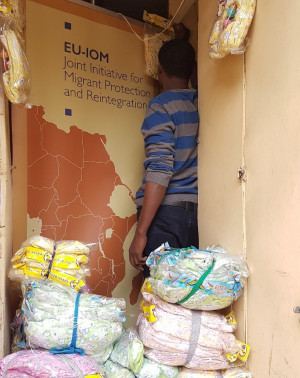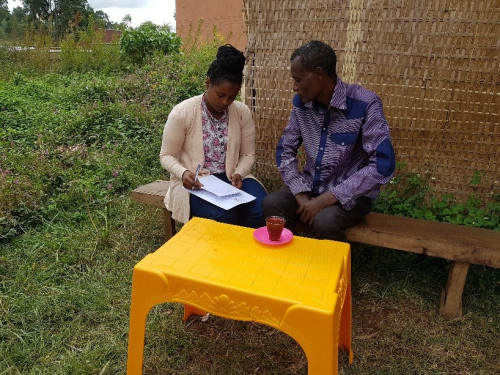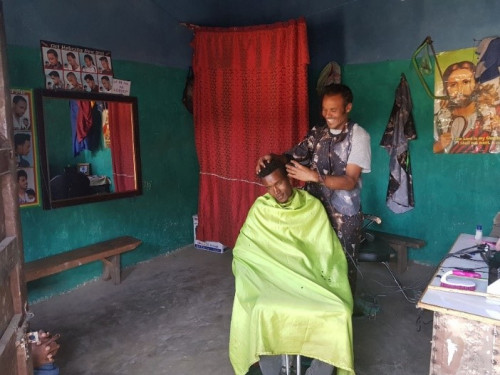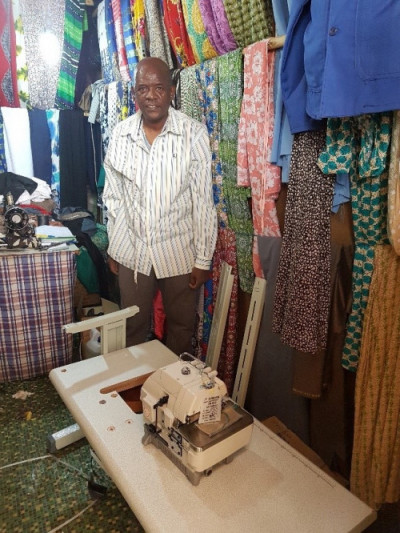Stories from Ethiopia
 Ahmed, Returnee from Norway
Ahmed, Returnee from Norway
Forty-three-year-old Ahmed was living in Gurage zone, a town located in Ethiopia’s Southern Nations Nationalities and People’s Region (SNNPR), when he decided to migrate to Norway. He lived in Norway for four years, working and earning a living. But his luck took a turn when the Norwegian government informed him of his immediate deportation back to Ethiopia. With neither money nor belongings on hand, he was forced to leave a country that he had started to call home. Under the care of the UN migration agency IOM, Ahmed received assistance when arrived in Addis Ababa. Following treatment for depression, Ahmed was stable enough to start implementing his reintegration plan, with support from the EU-IOM Joint Initiative. With no previous experience in the retail business, he took a chance and opened a shop in one of the biggest shopping centres in Ethiopia, Merkato, where he sells clothing items. Ahmed now has the long-term goal of to expanding his business.
The EU-IOM Joint Initiative facilitates orderly, safe, regular and responsible migration management through the development of rights-based and development-focused procedures and processes on protection and sustainable reintegration. The project, backed by the EU Trust Fund, covers and has been set up in close cooperation with a total of 26 African countries.
 Jemal, Returnee from Malawi
Jemal, Returnee from Malawi
Jemal, a 35-year-old Ethiopian returnee from Malawi recently left his family behind for the chance of starting a better life. He sold two hectares of his land and began his journey to South Africa. As he travelled on foot and also hitch-hiked, he was arrested in Malawi and detained in Lilongwe Maximum Security Prison for a year. In prison, he experienced sleepless nights, food shortages and poor personal hygiene. All this created a hopelessness that made him not want to continue his journey. In the meantime, IOM was reaching out to migrants in detention who were interested in receiving assistance to return home and also to be supported, under the EU-IOM Joint Initiative, to establish a means of earning a living. Without hesitation, Jemal took up the offer and returned to Ethiopia. On his arrival, IOM facilitated a reception service and he, among other returnees, was taken to the IOM Transit Center located in Addis Ababa (15 minutes away from Bole International Airport) where they received psychosocial support and reintegration counseling. He opted to go into cattle fattening and his reintegration plan was tailor-made for the selected business.
After a six-day training course in entrepreneurship and elements of kaizen (This is the Japanese principle of continuous improvement credited with Toyota’s success. It has gained unprecedented acceptance in Ethiopia more than in any other country in Africa), Jemal received a certificate. He then received feed and head of cattle to get him started in his business. Jemal sold three head cattle within three months and bought one dairy cow. He is hoping to start supplying cattle to the community. His future plan is to expand his business and to build a modern home for his family.
The EU-IOM Joint Initiative facilitates orderly, safe, regular and responsible migration management through the development of rights-based and development-focused procedures and processes on protection and sustainable reintegration. The project, backed by the EU Trust Fund, covers and has been set up in close cooperation with a total of 26 African countries.
 Kefelegn, Returnee from Malawi
Kefelegn, Returnee from Malawi
Thirty-eight-year-old Kefelegn, now married with two children, was born and raised in Hadiya Golcho Boyo, a small village located in Ethiopia’s Southern Nations Nationalities and People’s Region (SNNPR). He was unable to continue his education due to his family’s economic situation and decided to try his luck in South Africa. Back in 2016, his three brothers had also migrated to South Africa. Their encouragement of him to join them went as far as paying for his travel expenses. His route began in Hadiya, taking him through Hawassa - the capital of SNNPR - then through Moyale, a market town on the Ethiopia-Kenya border, then to Tanzania and finally Malawi where he was detained and faced physical abuse for 7 months. Soon after, he decided to return to Ethiopia. Upon his arrival, he was immediately taken to the IOM Transit Center in Addis Ababa (15 minutes away from Bole International Airport), where he received psychological support, accommodation and also support with transportation back home. After receiving reintegration and psychosocial counseling sessions, he attended a five-day training course that covered entrepreneurship and Kaizen (This is the Japanese principle of continuous improvement credited with Toyota’s success. It has gained unprecedented acceptance in Ethiopia more than in any other country in Africa). Following the training, he received in-kind economic reintegration support and started a barber shop business, with the support of the EU-IOM Joint Initiative. Kefelegn attends to 10-15 people daily, which gives him a net profit of 3000 ETB (109 USD) per month after covering his rent and other expenses. He is economically self-sufficient and in addition to taking care of his household needs, he is able to enroll his children in school covering all education expenses.
The EU-IOM Joint Initiative facilitates orderly, safe, regular and responsible migration management through the development of rights-based and development-focused procedures and processes on protection and sustainable reintegration. The project, backed by the EU Trust Fund, covers and has been set up in close cooperation with a total of 26 African countries.
 Mesfin, Returnee from Sudan
Mesfin, Returnee from Sudan
Mesfin, holder of an accounting diploma, was devastated when he was told he was ‘too old’ to be hired as a fashion designer at one of the top fashion companies in Ethiopia. In addition to his diploma, he also has a certificate from Zweditu Fashion Design Training Center, one of the well-known training centers in the heart of Addis Ababa. The 50-year-old decided to migrate to Sudan when his dream crumpled by one of the top stylists during his job interview with the fashion company nearly nine years ago. After migrating to Khartoum, he worked as a salesperson at a local supermarket and later he was hired as a teacher at a nearby school. At the end of 2016, Mesfin suffered from a severe medical condition and had to go under major surgery. The doctors suggested that he refrain from lifting heavy items or engaging in work that involves hard labour. Soon after he returned to Ethiopia, Mesfin got a second chance at the dream that he had long shelved. Finding someone who mends clothing for a living, he was allowed a small area on the premises to do the same. Under the EU-IOM Joint Initiative, he received an overlock sewing machine, some threads, measuring tape, scissors as well as two tables.
The EU-IOM Joint Initiative facilitates orderly, safe, regular and responsible migration management through the development of rights-based and development-focused procedures and processes on protection and sustainable reintegration. The project, backed by the EU Trust Fund, covers and has been set up in close cooperation with a total of 26 African countries.
